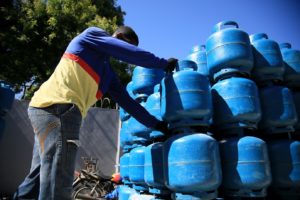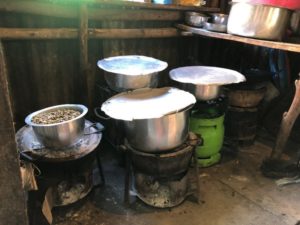Affordability of clean cooking solutions like liquefied petroleum gas (LPG) fuel is one of the biggest barriers to reducing exposure to household air pollution in low income households. New research suggests that “pay-as-you-go” smart meter technology may be the novel solution to this problem. This technology enables incremental fuel payments for households in place of paying the full upfront cost of an LPG cylinder. Studies assessing pay-as-you-go LPG cooking patterns showed that in spite of economic and other hardships, the amount of LPG consumed by households remained relatively stable. Such evidence illustrates how smart devices can help address the affordability challenges of clean cooking for at-risk populations, especially during COVID-19, and might promote sustainable living in the future.
Transitioning to Cleaner Cooking Solutions
Living in an informal settlement within Kenya’s capital city Nairobi, Anita and her family relied on polluting cooking fuels, such as wood and charcoal, that generate high levels of air pollution indoors. In spite of being aware of the health risks that come with burning unclean fuels, the family faces financial challenges when it comes to affording cleaner cooking fuel options, such as liquefied petroleum gas, that require high upfront cost. But things started to change when a company offered a new payment scheme so that Anita and her family can use their phones to purchase credits and pay for the costs of clean fuels in small increments. Through the provision of the pay-as-you-go technology, Anita’s family could afford the transition to a cleaner cooking solution and support the reduction of harmful emissions.

Co-benefits of PAYG LPG beyond fuel affordability
Not only Anita, her husband and children profited extensively by this new opportunity. Many other families in the settlement followed Anita’s example and started to use the pay-as-you-go technology with cleaner and safer LPG stoves. Families in the settlement also reported other benefits of PAYG LPG beyond fuel affordability. Additional to the flexible payment scheme, households also value the increased safety from burns/gas explosions, the ability to prepare multiple dishes simultaneously using the double-burner stove provided with the smart meter technology, and having fuel cylinders delivered directly to their home.
Household Air Pollution as a risk factor in Sub-Saharan Africa
Household air pollution generated from the use of inefficient stoves paired with polluting fuels like wood, charcoal, animal waste or kerosene is a leading risk factor for disease in Sub-Saharan Africa, particularly among women and children. Families like Anita’s suffer from high levels of household (indoor) air pollution, generated by inefficient fuel combustion. The release of such fine particulate matter and other pollutants do not only dramatically affect people’s health, but black carbon and methane are also powerful climate changing pollutants. Stoves powered by electricity or gas are clean and scalable solutions proven to reduce exposure to household air pollution and disease. Yet, affordability is a common barrier to their adoption by the poor and vulnerable households.

COVID-19 can affect affordability of Clean Cooking Solution
The ongoing pandemic also had negative impacts on the access to clean cooking solutions. A recent study[1] assessed effects of COVID-19 lockdown on clean energy access. During lockdown, a quarter of households who were buying LPG in bulk could not maintain its use in the face of loss of employment and income decline, ultimately switching to polluting cooking fuels such as kerosene or wood, which could be bought in smaller amounts or gathered for free. These households also tended to have had lower LPG consumption prior to lockdown and had suffered greater pandemic-related income loss compared to households that continued to use LPG. Thus, inequities in clean cooking fuel access may have been exacerbated by COVID-19 lockdown and may continue to do so in the light of the pandemic.
Smart Technology can increase affordability and access
Pay-as-you-go (PAYG) technologies can be a solution to address the high upfront cost for access to clean cooking fuels, particularly during times of the pandemic and lockdowns, by allowing consumers to purchase LPG credits in small increments (for example via mobile banking). In the same setting, another study[2] provided evidence that 95% of study households enrolled in the pay-as-you-go (PAYG) LPG programme during COVID-19 lockdown maintained use of the fuel source despite declines in household income. For comparison, in a separate town where the programme was not available, households reduced their average use of gas by 75%.

This study also showed how the food-energy nexus provides an opportunity to address two key Sustainable Development Goals (SDGs): achieving zero hunger (SDG 2) and universal affordable, modern and clean energy access (SDG 7) by 2030, further compounding the health benefits afforded through clean household energy. Ensuring that LPG is affordable, accessible and meets the dietary and cooking needs of families should be a policy priority for helping improve food and energy security among the urban poor while at the same time preventing diseases.
Since affordability is a key access barrier to clean cooking fuels for many, new technologies and innovative solutions need to be provided for poor and vulnerable communities around the globe. Relieving the financial barrier, also reinforced by COVID-19, and supporting the transition to clean cooking solutions will have major impacts on public health and our climate. Therefore, smart technologies, such as PAYG LGP could serve as an effective solution to accelerating the adoption of clean cooking, and achieving Sustainable Development Goals related to health, food, energy and climate.
[1] Matthew Shupler, James Mwitari, Arthur Gohole, Rachel Anderson de Cuevas, Elisa Puzzolo, Iva Čukić, Emily Nix, Daniel Pope, COVID-19 impacts on household energy & food security in a Kenyan informal settlement: The need for integrated approaches to the SDGs, Renewable and Sustainable Energy Reviews, Volume 144, 2021, 111018, ISSN 1364-0321, https://doi.org/10.1016/j.rser.2021.111018.
[2] Matthew Shupler, Mark O’Keefe, Elisa Puzzolo, Emily Nix, Rachel Anderson de Cuevas, James Mwitari, Arthur Gohole, Edna Sang, Iva Čukić, Diana Menya, Daniel Pope, Pay-as-you-go liquefied petroleum gas supports sustainable clean cooking in Kenyan informal urban settlement during COVID-19 lockdown, Applied Energy, Volume 292, 2021, 116769, ISSN 0306-2619, https://doi.org/10.1016/j.apenergy.2021.116769.
Find out more: Health and Energy Platform of Action